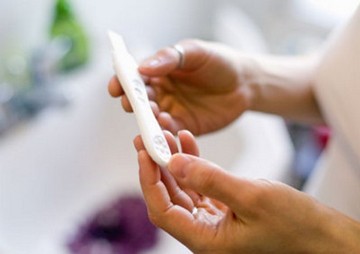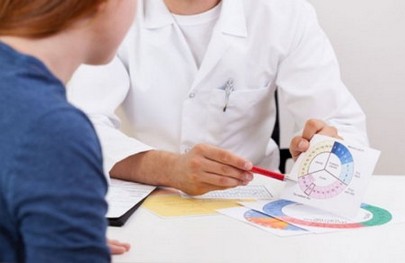Ovulation And Pregnancy

Contents:
- Is it Possible to Get Pregnant After the Ovulation?
- Why Doesn’t Pregnancy During Ovulation Happen?
- How to Detect Pregnancy After Ovulation?
Process Ovulation And Pregnancy
Ovulation and pregnancy are two closely connected terms. Most often, pregnancy happens on the day of ovulation. It is considered to be the best time for conceiving. If you have been planning pregnancy for quite a long time, ovulation is your chance to finally conceive a baby. This is the chance you have every month.
Ovulation is a short period during your cycle that happens in time between the 12th and 15th day. It usually lasts for 24-48 hours. This is exactly the time that your ovum need to get out of the ovary and go down a fallopian tube to the uterus. There is a higher possibility to get pregnant during ovulation. That’s why a woman that wants to get pregnant as fast as possible needs to know exactly the date of the ovulation. You should plan having sex several days before this day X or during it.
Is It Possible To Get Pregnant After The Ovulation?
If ovulation has come to an end, you need to wait for your next cycle in order to get pregnant. There is a low possibility to get pregnant after the ovulation. The thing is that an ovum that hasn’t met a spermatozoid within 24 hours will just get destroyed. However, if a woman had a case of late ovulation, that happened before periods, there is a possibility to get pregnant.
The specifics of periods are unique in every case. It is possible to determine the exact day of the ovulation by using pregnancy calculator that can determine the time of ovulation. There are lots of such like programmes on the Internet. Once you specify the duration of your periods, the programme gives you an approximate date of ovulation. However, this is only appropriate for those women whose periods always start on one and the same time. One more way to “catch” ovulation on time and differ between an ovulation and pregnancy is to have a graphic of your basal temperature.
The pregnancy after ovulation doesn’t always happen. Consequently, many women want to know the answer to the following question: How can it happen that there is a period of ovulation but pregnancy doesn’t happen? There are lots of reasons for that and this is not exactly a woman that is guilty of that.
Why Doesn’t Pregnancy During Ovulation Happen?

- There was no ovulation. If a woman determined the time of ovulation with the help of the calendar but didn’t use an ultrasonic investigation or tests to prove that the time is right, it is possible that there was no ovulation in the time when a woman expected it to happen. Hormonal changes, stresses, various inflammation diseases could lead to the situation where there was no ovulation. After a case of a missed abortion, the period of ovulation is delayed.
- The ovum hasn’t become mature enough. Even a young and healthy woman has at least 1 month in the year when an ovum doesn’t get mature enough. If a woman has recently given birth to a baby or she is breastfeeding at the moment, it will be more difficult for her to get pregnant, even during the time of ovulation.
- A low quality sperm. If a pregnancy doesn’t happen after ovulation, a man needs to make a spermogram test and check the number of active spermatozoids.
- Immunogenetic disparity. If after the ovulation there are no signs of pregnancy and within 2 weeks periods occur, this means that something gets in the way of an ovum an a spermatozoid’s meeting. For example, there may be antibodies in the cervical mucus that reject the spermatozoids of this exact man.
- Gynecological illnesses. There is a very high possibility to get pregnant on the day of ovulation if a woman is healthy. If a woman has gynecological illnesses (polycystic ovary syndrome, inflammation of the ovaries, fallopian tubes obstruction), irrespective of the ovulation, it will be hard or even impossible to get pregnant without having a necessary treatment beforehand.
- Psychological reasons or stress. Very often, doctors diagnose a false pregnancy. This is a state when, actually, there is nothing that can prevent you from getting pregnant (a woman is healthy and her ovulation happens regularly), however, there is no pregnancy occurring. Stress or a woman being too much obsessed with this problem may be the reasons. The process of getting pregnant after the ovulation has been studied very thoroughly. It is known that it’s not only a process connected with medicine and physiology. It is also a miracle that is very often impossible to explain.
- If a couple really wants a baby and they have sex several days before the ovulation and during it, the though of whether or not it has finally worked doesn’t give them a chance to relax and wait for the next periods or a delay in them. This desire to have a baby makes you look for symptoms of pregnancy right after the ovulation. You start to be more attentive as to the way you feel and listen to the advices of other people.
How To Detect Pregnancy After Ovulation?
It’s too early to make a test or go to an ultrasonic investigation right after the ovulation. The test won’t detect any pregnancy since the production of HCG hasn’t been started yet. You may make a test on the 7th – 10th day after the ovulation. By this time, your ovum, if it has been fertilized, will already fasten to a wall of the uterus and the production of HCG will start. Before that, all you have to do is to pay attention to the symptoms of pregnancy after ovulation. There are lots of them, but they do not guarantee that pregnancy will occur.
The Symptoms Of Pregnancy Right After The Ovulation:
- Pains or spasm in the lower part of your bally. If a woman had an ovulation, pains in the lower part of the belly may mean that she’s pregnant. Sometimes, there are pains in the right or left side of a belly.
- Breast changes. Your breasts being tough and sensitive, the change of colour and size of the aureoles, your breasts becoming bigger – these are all the signs that can occur after the ovulation and tell you that you’re pregnant.
- Bloody discharges. If a week after the ovulation has passed, not abundant bloody discharges may be a sign of pregnancy. This is the so-called implantation bleeding. It means that a fertilized ovum has fastened itself to a wall of the uterus.
- Digestion problems. Before toxicosis occurs, a pregnant woman faces a situation when her belly is drum and a high level of gases production.
- A high basal temperature. If pregnancy occurs, you will have a high basal temperature during the whole period of the 2nd stage of the cycle.
The symptoms of ovulation and pregnancy are very much alike. That’s why a woman may sometimes be mistaken and think that there is pregnancy when, in fact, there is only ovulation. You shouldn’t rely on your sensations too much and start looking for the symptoms of pregnancy that may or may not occur after the ovulation. It’ll be batter to make a pregnancy test on the 10th – 14th day after the ovulation. If it’s necessary, you may check whether you’re pregnant by undergoing an ultrasonic examination.